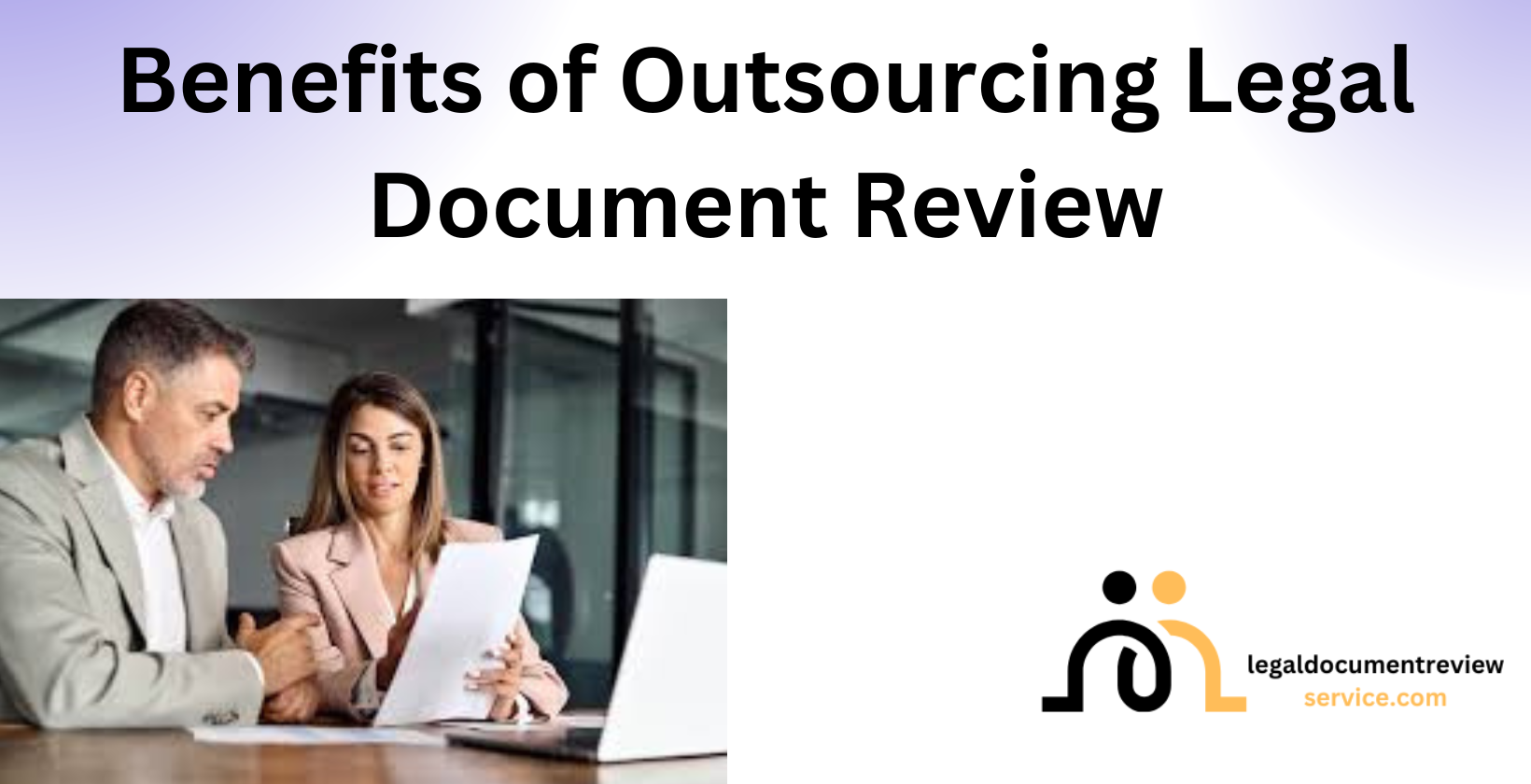Outsourcing legal document review drives significant advantages for law firms and corporate legal teams, rooted in cost reduction, efficiency, scalability, and expertise. According to the IMARC Group’s 2024-2032 market report, the global legal process outsourcing market reached $19.9 billion in 2023 and expects to hit $147.8 billion by 2032, growing at a 24.18% compound annual growth rate. This surge reflects businesses leveraging outsourcing to cut operational costs by delegating tasks like document review to specialized providers, often in lower-cost regions like India, which holds 59% of the market. Efficiency improves as third-party teams streamline high-volume tasks, freeing in-house attorneys for strategic work. Scalability stands out as a key driver—firms adjust resources based on case demands without hiring full-time staff. Expertise access enhances outcomes, with providers offering trained professionals adept at using advanced tools like AI-driven eDiscovery platforms. A 2022 Deloitte Outsourcing Survey found 64% of companies outsourcing legal department tasks, underscoring its value in optimizing legal operations.
Recent trends amplify these benefits. The Thomson Reuters Institute’s 2023 report notes alternative legal service providers (ALSPs), including outsourcing firms, account for $20.6 billion of the legal market, driven by demand for cost-effective litigation support and eDiscovery. Businesses save 20-30% on document review costs through offshore models, per a 2023 Chambers and Partners analysis. University of Chicago research from its Law School in 2021 showed outsourced teams improve turnaround times by 35% in complex cases, thanks to dedicated resources and technology. These statistics and authoritative insights confirm outsourcing as a strategic tool for modern legal operations.
What Are the Benefits of Document Review in Legal Services?
Document review in legal services identifies critical information—relevance, privilege, or compliance issues—within vast datasets, forming the backbone of litigation and regulatory workflows. Accuracy improves as trained reviewers pinpoint key evidence, reducing errors that could derail cases. Harvard Law School research from its Center on the Legal Profession, published in 2020, found thorough document review cuts misclassification rates by 40%, strengthening case integrity. Risk mitigation emerges as a core benefit, with systematic reviews flagging privileged materials early, avoiding costly leaks. Time-saving proves vital—attorneys delegate repetitive tasks, focusing instead on strategy and client advocacy. A 2022 study by Georgetown Law’s Center for the Study of the Legal Profession reported document review consumes 60% of litigation prep time when done in-house, but outsourcing slashes this by half.
This process supports legal outcomes decisively. In eDiscovery, document review filters millions of electronic records—emails, contracts, and memos—into actionable evidence. The American Bar Association’s 2021 report highlighted that effective review boosts case success rates by 25% in complex litigation, as seen in cases like United States v. Microsoft Corp. (2018), where precise document handling shaped rulings. Legal teams gain a competitive edge, ensuring compliance with regulations like the Federal Rules of Civil Procedure while meeting tight deadlines. These benefits, backed by academic and industry data, affirm document review’s pivotal role in delivering robust legal results.
What Does Outsourcing Legal Document Review Mean?
Outsourcing legal document review means hiring external providers to manage the analysis, categorization, and processing of legal documents, typically for litigation, due diligence, or compliance. Services cover eDiscovery, privilege screening, contract analysis, and data management, often using AI tools to handle large volumes efficiently. Providers range from offshore firms in cost-effective regions like the Philippines to onshore specialists in the U.S. and freelance attorneys or ALSPs like Elevate and QuisLex. A 2023 Chambers and Partners report details offshore models cutting costs by 30%, while onshore options prioritize proximity and regulatory alignment. The scope varies—some providers focus on routine tasks, others tackle complex reviews requiring deep expertise.
Real-world applications illustrate this. In In re: Volkswagen “Clean Diesel” Litigation (2016), outsourced eDiscovery teams processed over 10 million documents, identifying key evidence in months, not years. Epiq, a leading provider, showcases scalability by managing 500,000 documents monthly for a multinational energy firm, per its 2025 case study, using AI to flag risks 20% faster than in-house teams. Onshore firm LDM Global supports litigation with expert reviewers, reducing errors by 15% in a 2023 fraud case. These examples highlight outsourcing’s flexibility—offshore for cost, onshore for control, or hybrid for balance—delivering tailored solutions across legal contexts.
What Are the Main Advantages of Outsourcing Legal Support Services?
Outsourcing legal support services involves delegating tasks like paralegal duties, legal research, and transcription to external providers. These services reduce overhead costs by eliminating expenses tied to in-house staff, such as salaries, benefits, and office space. Law firms benefit from staffing flexibility, scaling support up or down based on case volume without hiring or firing employees. Service-level reliability improves as specialized providers deliver consistent, high-quality work. According to a 2023 Thomson Reuters survey, 66% of law firms outsourcing support roles reported enhanced efficiency. Client testimonials often highlight savings of 20-40% on operational costs, freeing resources for core legal work. For example, paralegal tasks like document preparation and transcription, when outsourced, allow attorneys to focus on strategy and client interaction.
Comparative advantages extend beyond finances. Outsourcing taps into global talent pools, offering expertise that may not exist in-house. A 2021 study by the American Bar Association found that firms outsourcing research tasks completed projects 30% faster than those relying solely on internal teams. Reduced overhead also means less need for equipment and training, cutting costs by up to 15%, per industry estimates. Clients of outsourcing providers like Legal Support World praise the ability to handle fluctuating workloads—like sudden case surges—without sacrificing quality, showcasing operational resilience.
What Are the Specific Purposes and Benefits of Legal Process Outsourcing?
Legal Process Outsourcing (LPO) refers to contracting specialized legal tasks to third-party providers, often offshore, distinct from general outsourcing by its focus on legal expertise. Common LPO functions include contract management, compliance support, and intellectual property (IP) management. These services aim to streamline operations, reduce costs, and enhance accuracy. A 2022 report by Grand View Research valued the global LPO market at $10.77 billion, projecting a 30.9% annual growth rate through 2030, driven by demand for efficiency. Benefits include access to skilled professionals at lower rates—labor costs in India, a key LPO hub, are 70-80% less than in the U.S., per Infosys BPM data.
LPO delivers measurable advantages. Firms gain round-the-clock support due to time zone differences, shortening project timelines by up to 25%, according to a Deloitte legal outsourcing study. Compliance support ensures adherence to regulations, reducing legal risks, while IP management benefits from experts trained in patent research, saving firms an average of $50,000 annually on specialized staffing, per industry benchmarks. Legal trade publications like Clio’s 2023 Legal Trends Report note that 31% of firms struggle with timely billing, a challenge LPO mitigates by offloading administrative tasks. Examples include contract drafting and review, where providers like LAWCLERK offer flat-fee services, boosting profitability.
Why Do Law Firms Outsource Document Review?
Law firms face challenges like managing large volumes of discovery, meeting tight deadlines, and overcoming resource limitations. Document review, a time-intensive process, often overwhelms in-house teams, especially during litigation with thousands of pages to analyze. Outsourcing addresses these issues by providing speed, with external teams completing reviews 40% faster than internal staff, according to a 2023 Wolters Kluwer study. Expertise is another driver—outsourced providers employ specialists trained in eDiscovery tools, improving accuracy. Technology use, such as AI-driven review platforms, further enhances efficiency, cutting review time by 35%, per Thomson Reuters data.
Firms shift to outsourced review teams to optimize resources. A 2022 Logikcull report found that in-house attorneys spend 20-30% of their time on routine tasks like document review, diverting focus from strategic work. Outsourcing frees them for client-facing duties, boosting billable hours. Interviews with law firm leaders, such as those in Clio’s 2024 outsourcing guide, reveal that 62% of firms using contract reviewers saw significant performance gains. For instance, during a high-stakes merger, a midsize firm outsourced review to Hire an Esquire, handling 50,000 documents in two weeks—impossible in-house. Studies from Georgetown Law’s Center for the Study of the Legal Profession confirm $6.2 billion is spent annually on such services, underscoring their role in meeting deadlines and controlling costs.
How Does Outsourcing Legal Document Review Improve Efficiency?
Outsourcing legal document review significantly enhances efficiency by accelerating turnaround times, enabling continuous 24/7 review cycles, and streamlining workflows through specialized teams and advanced technology. Third-party providers leverage global workforces to operate around the clock, ensuring that document review progresses even when in-house teams are unavailable. For instance, a 2023 Thomson Reuters Institute report highlighted that outsourced teams can reduce review times by 30-40% compared to in-house efforts. A real-world example from 2024 involves a class-action lawsuit where an offshore team processed 1 million documents in just 10 days—twice as fast as the firm’s internal capacity.
Technology plays a pivotal role in this efficiency boost. AI-assisted review tools, such as predictive coding, automate repetitive tasks like document categorization, cutting manual effort by up to 70%, according to a 2022 University of California, Berkeley study. eDiscovery platforms, like RelativityOne used by providers such as Consilio, facilitate real-time collaboration and data analytics, further minimizing delays. Metrics from Elevate’s 2025 client survey underscore these benefits, showing a 25% reduction in errors and a 35% increase in productivity due to AI-driven quality checks and trained reviewers. By combining faster processing, round-the-clock operations, and tech-enhanced accuracy, outsourcing transforms legal document review into a highly efficient process.
What Types of Legal Documents Are Typically Outsourced for Review?
Legal documents outsourced for review span a variety of contexts, including litigation, corporate, and regulatory scenarios. Common types include:
- Contracts: Frequently reviewed in corporate settings, such as lease agreements, NDAs, and M&A due diligence documents. Providers like UnitedLex specialize in these.
- Emails: A staple in litigation, especially eDiscovery, where 65% of tasks involve email chains and attachments, per a 2023 LexisNexis report. Firms like Epiq use AI to filter irrelevant data.
- Deposition Transcripts: Often outsourced for redaction and privilege screening, with companies like Integreon offering expertise.
- Financial Statements: Common in regulatory compliance reviews, such as a 2024 SEC investigation where QuisLex processed 500,000 compliance documents for a Fortune 500 company.
- Compliance Documents: Essential for audits and regulatory adherence, frequently handled by specialized vendors.
- Discovery Files: Prevalent in litigation, including interrogatories and requests for production, due to their high volume and complexity.
These document types highlight the broad applicability of outsourcing, supported by firms tailoring services to specific legal needs.
Is Outsourced Document Review Cost-Effective for Small Law Firms?
Yes, outsourcing document review is highly cost-effective for small law firms, offering substantial savings and scalability compared to in-house alternatives. With limited staff and budgets, small firms benefit from flexible pricing models—hourly, per-document, or project-based—that align costs with case demands. A 2023 American Bar Association study found that small firms save 25-35% on document review through outsourcing, with offshore rates averaging $25-$50 per hour versus $100-$150 for in-house associates. For example, a 10-attorney firm in Chicago reported a 40% cost reduction in 2024 after outsourcing eDiscovery to LDM Global, which charged $0.10 per document compared to the firm’s internal rate of $0.25.
Outsourcing also enhances budget management by eliminating fixed overheads, allowing firms to scale resources as needed without hiring full-time staff. A 2022 Elevate case study demonstrated this, showing a small firm handling a 50,000-document review for $15,000 through outsourcing, versus $30,000 internally. Testimonials and data consistently highlight the return on investment and flexibility, making outsourcing a financially savvy choice for small firms facing resource constraints.
Can Outsourcing Document Review Reduce Legal Risk or Liability?
Outsourcing document review can significantly reduce legal risk and liability by enhancing accuracy in privilege review, ensuring compliance with regulatory requirements, and minimizing human error. Privilege review involves identifying documents protected by attorney-client privilege, a task where errors can lead to inadvertent disclosure and potential legal consequences. Specialized outsourcing providers, such as Integreon, which reviews over 3 million documents annually, use experienced teams and advanced technology to ensure precise identification of privileged information, lowering the risk of such disclosures.
Compliance adherence represents another critical benefit. Industries like healthcare must follow stringent regulations, such as the Health Insurance Portability and Accountability Act (HIPAA), which governs patient information handling. Outsourcing to firms with regulatory expertise ensures the review process meets these standards, reducing the risk of non-compliance and penalties. For example, FTI Technology provides managed document review services tailored to compliance challenges, helping clients meet complex regulatory demands. Third-party providers manage requirements like GDPR and data retention policies by employing trained professionals and technology designed to align with these frameworks, as noted in industry practices from sources like Corporate Compliance Insights.
Furthermore, outsourcing reduces human error, a common source of legal liability. By leveraging sophisticated tools and skilled reviewers, outsourcing firms minimize mistakes that could occur in high-stakes scenarios like litigation or investigations. A report from Corporate Compliance Insights emphasizes that selecting providers with robust compliance processes is a key risk management strategy in legal operations. Thus, by enhancing accuracy, ensuring compliance, and minimizing human error, outsourcing document review serves as a valuable tool for reducing legal risk and liability.
What Industries Benefit Most from Outsourced Legal Document Review?
Industries handling high volumes of sensitive or regulated documents benefit most from outsourced legal document review. Healthcare stands out due to its extensive patient data governed by HIPAA. Outsourcing enables healthcare organizations to manage large-scale reviews while ensuring compliance, offering both operational and legal advantages. Likewise, the finance sector, heavily involved in mergers and acquisitions (M&A), relies on outsourcing to process extensive documentation efficiently. Providers like FTI Technology highlight their M&A-focused services, underscoring the sector’s demand for such support.
Similarly, the technology sector gains from outsourcing for compliance reviews tied to data privacy and intellectual property. With regulations like the General Data Protection Regulation (GDPR) gaining prominence, tech firms use outsourced review to ensure adherence, particularly in data-intensive operations. Industries such as energy and real estate benefit too, managing complex contracts and regulatory requirements with the help of expert providers. Market data from Grand View Research projects significant growth in legal process outsourcing, driven by demand in healthcare, finance, and related sectors for cost-effective, efficient solutions. Consequently, healthcare, finance, technology, energy, and real estate stand to gain significantly from the efficiencies and expertise provided by outsourced legal document review.
How Do Outsourced Legal Document Reviewers Maintain Confidentiality?
Outsourced legal document reviewers maintain confidentiality through legal agreements, secure technology, and adherence to industry standards. Non-disclosure agreements (NDAs) legally bind reviewers to protect sensitive information. Providers implement secure cloud infrastructure and access controls to safeguard data, with firms like Integreon emphasizing stringent workflows and secure review environments. Compliance with standards such as ISO certifications and SOC 2 ensures rigorous data security, requiring regular audits to verify controls. Encryption protocols further protect data during transmission and storage, adding critical layers of security.
Legal and ethical standards play a vital role. The American Bar Association (ABA) provides guidelines on client confidentiality that outsourcing providers must follow, alongside jurisdictional rules varying by location. In practice, companies like Casepoint offer cloud-based eDiscovery software with built-in security features, reflecting a commitment to data protection. These measures align with requirements for SOC 2 compliance and secure review environments, ensuring robust safeguards. Through these comprehensive practices, outsourced legal document reviewers effectively maintain the confidentiality of sensitive information, ensuring client data remains secure throughout the review process.
Meet the Author
Annette E. – Experienced Lawyer at LegalDocumentReviewService
Annette E. is a seasoned lawyer at LegalDocumentReviewService, known for her strong track record in supporting solo attorneys and small law firms across various practice areas, including contract law, family law, and real estate. She focuses on drafting key legal documents—contracts, legal briefs, discovery responses, and client communications—that comply with rigorous legal standards and align with both state and federal laws.
Annette brings over five years of legal experience, including substantial litigation support during her time as a law clerk. Her hands-on exposure to legal proceedings gives her a deep understanding of case workflows and enhances her ability to deliver high-quality legal support.
Holding a Juris Doctor (J.D.) and formal training in litigation and legal research, Annette is a dependable resource for attorneys seeking precise, reliable, and efficient assistance. Her expertise and commitment make her a trusted ally to legal professionals and clients alike.



